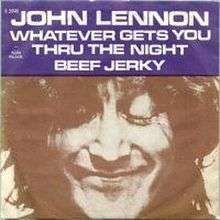Whatever Gets You thru the Night
| "Whatever Gets You thru the Night" | ||||||||||||
|---|---|---|---|---|---|---|---|---|---|---|---|---|
 | ||||||||||||
| Single by John Lennon | ||||||||||||
| from the album Walls and Bridges | ||||||||||||
| B-side | "Beef Jerky" | |||||||||||
| Released |
23 September 1974 (US) 4 October 1974 (UK) | |||||||||||
| Format | 7" | |||||||||||
| Recorded | June–July 1974 | |||||||||||
| Genre | Rock | |||||||||||
| Length | 3:27 | |||||||||||
| Label | Apple | |||||||||||
| Writer(s) | John Lennon | |||||||||||
| Producer(s) | John Lennon | |||||||||||
| John Lennon singles chronology | ||||||||||||
| ||||||||||||
| ||||||||||||
"Whatever Gets You thru the Night" is a song written by John Lennon, released as a single in 1974 on Apple Records, catalogue Apple 1874 in the United States and Apple R5998 in the United Kingdom.[1] It peaked at number 1 on both the Billboard Hot 100 and Cashbox Top 100.[2] It also peaked at number 36 on the British singles chart.[1] It was the lead single for the Walls and Bridges album in the US; in the UK it was released the same day as the album.
In Canada, the song spent two weeks at number two, and became the 30th biggest hit of 1974.[3]
Content
This was Lennon's only solo number 1 single in the United States during his lifetime, and Lennon was the last member of The Beatles to achieve his first American number one solo hit. The recording featured Elton John on harmony vocals and piano. While in the studio, Elton bet Lennon that the song would top the charts, and such was Lennon's scepticism that Elton secured from him a promise to appear on stage at one of his performances should the record indeed hit number one. When the record did achieve that feat, Lennon appeared at Elton John's Thanksgiving performance at Madison Square Garden on 28 November 1974. It was his last major concert appearance.
The inspiration for the lyrics came from late-night television. In December 2005, May Pang told Radio Times: "At night he loved to channel-surf, and would pick up phrases from all the shows. One time, he was watching Reverend Ike, a famous black evangelist, who was saying, "Let me tell you guys, it doesn't matter, it's whatever gets you through the night." John loved it and said, "I've got to write it down or I'll forget it." He always kept a pad and pen by the bed. That was the beginning of 'Whatever Gets You thru the Night'."
The music was inspired by the number one single at the time, "Rock Your Baby" by George McCrae.[4][5] Although the released track bears little resemblance, the inspiration is more apparent on the alternative version released on John Lennon Anthology.
This track was not Lennon's first choice for a single. It was chosen by Capitol Records vice-president Al Coury, who had recently worked his singles 'magic' with Paul McCartney's Band on the Run album.[6] Lennon created a promotional film for the song, in which he lip-synced the first verse while walking through Manhattan. Yoko Ono later created an alternate video for the song, featuring an animation of Lennon's drawings.
In 2007, Yoko Ono granted Amnesty International the opportunity to have a number of bands cover John Lennon's solo songbook, which includes this song. Los Lonely Boys and Les Trois Accords performed it as the second single from the Instant Karma: The Amnesty International Campaign to Save Darfur album.
The live recording with the Elton John Band was released in 1981 on the EP 28th November 1974.[7] The recording is also available on the Lennon box set and the 1996 remastered edition of Elton John's Here and There album.
Chart performance
Weekly singles charts
|
Year-end charts
|
Personnel
The musicians who performed on the original recording were:[14]
- John Lennon – lead vocals, guitar
- Elton John – harmony vocal, piano
- Ken Ascher – clavinet
- Jesse Ed Davis – electric guitar
- Arthur Jenkins – percussion
- Jim Keltner – drums
- Bobby Keys – saxophone
- Ron Aprea - saxophone
- Eddie Mottau – acoustic guitar
- Klaus Voormann – bass
The musicians who performed on the 1974 live recording were
- John Lennon – guitar, vocals
- Elton John – harmony vocal, piano
- Dee Murray - bass
- Nigel Olsson - drums
- Ray Cooper - percussion
- The Muscle Shoals – horns
References
- 1 2 Blaney, John (2005). "1973 to 1975: The Lost Weekend Starts Here". John Lennon: Listen to This Book (illustrated ed.). [S.l.]: Paper Jukebox. p. 135. ISBN 978-0-9544528-1-0.
- ↑ Blaney, John (2005). John Lennon: Listen to This Book (illustrated ed.). [S.l.]: Paper Jukebox. p. 326. ISBN 978-0-9544528-1-0.
- ↑ http://www.collectionscanada.gc.ca/rpm/028020-119.01-e.php?file_num=nlc008388.3893a&brws_s=&type=1&interval=20&PHPSESSID=96v4f86jhlhf8toiujeff8oh71
- ↑ Playboy Interview, Sheff, 1981
- ↑ Blaney, John (2005). "1973 to 1975: The Lost Weekend Starts Here". John Lennon: Listen to This Book (illustrated ed.). [S.l.]: Paper Jukebox. p. 138. ISBN 978-0-9544528-1-0.
- ↑ Pang "Instamatic Karma" 2008
- ↑ "Elton John Band Featuring John Lennon And Muscle Shoals Horns, The* - 28th November, 1974 at Discogs". Discogs.com. 28 November 1974. Retrieved 30 October 2012.
- ↑ http://www.top40db.net
- ↑ http://cashboxmagazine.com/archives/70s_files/1975
- ↑ http://www.collectionscanada.gc.ca/rpm/028020-119.01-e.php?&file_num=nlc008388.3950a&type=1&interval=50&PHPSESSID=ovsia94ipgfsd02dotc6sneu40
- ↑ http://www.oldiesloon.com
- ↑ http://www.officialcharts.com/artist/_/john%20lennon/
- ↑ http://www.collectionscanada.gc.ca/rpm/028020-119.01-e.php?&file_num=nlc008388.3893a&type=1&interval=50&PHPSESSID=vovgbmiai2h2bt2ti1gn3a61a4
- ↑ Blaney, John (2005). John Lennon: Listen To This Book. Guildford, Great Britain: Biddles Ltd. p. 145. ISBN 0-9544528-1-X.
External links
- John Lennon - Whatever Gets You Thru The Night at Graham Calkin's Beatles Pages.
- Original video for "Whatever Gets You Thru the Night" on YouTube
- Lyrics of this song at MetroLyrics
| Preceded by "You Ain't Seen Nothing Yet" by Bachman–Turner Overdrive |
Billboard Hot 100 number-one single 16 November 1974 (one week) |
Succeeded by "I Can Help" by Billy Swan |
| ||||||||||||||||||||||||||||||||||||||||||||||||||||||||||||||||||||||